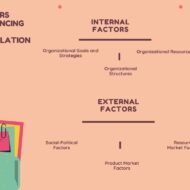Posted by Managementguru in Business Management, Decision Making, Marketing, Organisational behaviour, Principles of Management, Strategy
on Mar 23rd, 2014 | 0 comments

Smart Objectives for Success An objective describes something which has to be accomplished and defines what organizations, functions, departments, teams and individuals are expected to achieve. Objectives may be operational or developmental. When the contribution is oriented towards the accomplishment of corporate objectives, in the light of the organization’s mission, core values and strategic plans, it is termed as operational; personal or learning objectives that involve the improvement of knowledge, skills and performance of individuals is termed as developmental. Objectives must be SMART: S-scientific M-motivating A-achievable R-realistic T-time bound Objectives that are mostly confined to the near future may be termed-short term objectives, which are accomplished in the stipulated time duration. Say, for example, 1000 units of pet bottles have to be produced in a week’s time. If the firm is focused on the overall production plan for the forthcoming year, then it is termed as long term objective. In a production environment, a firm has to initially go for an aggregate plan, where the production capacity of the plant is determined to make the project feasible. The firm has to make doubly sure, whether it is resourceful in terms of physical, financial and human aspects. The work centers are allotted with jobs in a mock trial to check man versus machine co-ordination and compatibility. Pic Courtesy: Digital Information World Proper Planning: Objectives are achieved only when there is proper planning. The top management must take the pains to clearly explain the objectives to all the employees across different levels of organization to facilitate smooth functioning. When the employees understand what is expected of them, the performance gets oriented towards accomplishing the objectives; the employees get proper direction and focus. Delivering Happiness: A Path to Profits, Passion, and Purpose Think of this, what will happen to the sales volume, if the marketing manager does not properly educate his team about the targets to be achieved for that quarter? Definitely there will be a dip in the sales owing to the lethargic and irresponsible attitude of the manager. Ultimately, the organization stands to suffer a loss in terms of time and cost of recruiting a new person to head the marketing department. Right Person for the Right Job: Organizations have to be meticulous while choosing people for the post of managers. The chosen persons must be able to identify themselves with the organization and its objectives, so that they could be a source of inspiration for people down the line. Right people for the right job, at the right place and right time is the success mantra. Objectives have to be periodically revised in the light of changing economic, political and technological developments. How to Stop Worrying and Start Living If not the objectives might become obsolete and in due course you will get stranded amidst the roaring competition. The process of business management aims at managing people and other resources to make a modest profit. How to achieve success in an open market? By clearly setting objectives that serve as tools of motivation and persuasion, a firm can evolve and contribute strategic inputs that make the objectives realistic and...

Posted by Managementguru in Business Management, Strategy
on Feb 18th, 2014 | 0 comments

The basic factors that influence policy formulation are 1. The objectives of a business firm 2. Its management structure 3. Economic and financial resources available to it at a particular point of time 4. Attitudes, social values and norms of the top management 5. Fiscal and monetary policies of the government 6. Policies of sister concerns and business associations 7. Government regulations and control measures 8. Public opinion and expectations from business etc. You can never evade your responsibility towards the society and your policies must incorporate statements that reflect your interest in the welfare of the society. In corporate business environment, where voluminous business activity is carried on, corporations have very well understood the fact that, acquisition and utilization of resources from the society has to be repaid in the form of contributions to societal welfare. Otherwise their image might get tarnished. Moral and ethical values of a society also influence the mind set of business persons. In countries like India, where people ardently follow traditions and customs, a business person hailing from such a family will definitely try to maintain minimum ethical standards both in personal as well as business environments. Policy Aspects: Business policies cover all the functional areas such as production, marketing, personnel and finance aspects. Major policies pertaining to overall objectives, procedures and control affect the organization as a whole. Minor policies on the other hand, cover relationship in a segment of an organization, with considerable emphasis on details and procedures. Such policies are an outgrowth of major policies and preserve their unity of purpose. They meet the day-to-day requirements of the departments and are generally decided at the sectional and departmental levels. Various Corporate Policies: Strategic business policies cover aspects such as product-mix, promotion-mix, market-mix, administrative policies etc.; HR policies cover a wide range of aspects such as pay, promotions, recruitment, selection, induction, training and development, pension, disciplinary action, quality of work life and so on. So, to attain clear-cut objectives, firms need related business policies, in the absence of which, the firm may lose grip and direction in the overall management of the...




